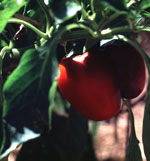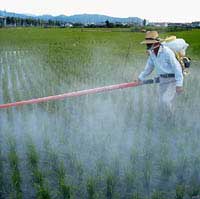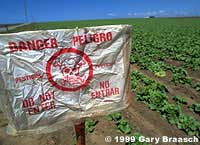近來(美國)關於有機食物新聞話題突然熱門起來。(新聞媒體大肆宣傳說 :) 「有機食物其實對你一點好處也沒有。這些有機產品中充滿了細菌和昆蟲的殘肢斷骸。你們這些付高價購買這些食物的人們,不只是被騙的傻瓜,而且是在冒著自身健康的危險。」
 最近美國新聞網 (ABC) 的記者強史托索(John Stossel)訪問了(前農業部專專員) 丹尼斯艾福利(Dennis Avery),「誰說有機農產品是用堆肥養大的。」(他的口氣是:「喔!不!告訴我這不是真的!」)他接著又說: 「我們知道,堆肥裡面「爬滿了細菌」。況且,有機農民在「浪費土地與資源,因為 (過程中),有機農產品的總產量大受雜草與昆蟲影響 (而減少) 。」
最近美國新聞網 (ABC) 的記者強史托索(John Stossel)訪問了(前農業部專專員) 丹尼斯艾福利(Dennis Avery),「誰說有機農產品是用堆肥養大的。」(他的口氣是:「喔!不!告訴我這不是真的!」)他接著又說: 「我們知道,堆肥裡面「爬滿了細菌」。況且,有機農民在「浪費土地與資源,因為 (過程中),有機農產品的總產量大受雜草與昆蟲影響 (而減少) 。」
在我開始質疑為什麼人人都想要成為「有機產品的一流評論家」這個問題之前,讓我很快地解釋一下他的誤解。
所有的作物,無論是不是有機的,都是用堆肥栽培的。只要他能設法取得堆肥,任何有常識的農夫都會這麼做,因為堆肥是一種又便宜有持久的肥料。它不只提供養份,並且有助土壤保持水份,使土壤成為適合植物著根的材質 - 這和袋裝肥料不同。
維生的養份循經土壤、植物/農作物、動物與堆肥,最終再回到土壤,此一循環是不滅的。自從有農業開始,農人就操作著這樣的循環。我自己也是個女農夫,數十年來我時常與雞、羊、乳牛與馬的排洩物接觸,而我還活著來述說這個堆肥的故事 (當個活的見證人)。任何知道要洗手和洗菜的人都不必擔心堆肥。殺蟲劑更難洗,特別是那些經基因轉殖,每個細胞都有殺蟲劑的植物。若要我在真材實料的乳牛奶油派 (這裡指新鮮的牛便便 )和馬拉松 (malathion,一種農藥之商標名) 之間做選擇,不用懷疑我會選擇那一種 (牛便便)。
栽培有機作物的農人並不比其他農人受到更多的害蟲或雜草危害。他們的產量沒有減低,雖然 (受訪人)丹尼斯艾福利(在雷根時代任職於農業部,而現在為右翼的哈德遜協會(Hudson Institute)工作,始終堅稱不然。(他相信 :)使用農藥與有機堆肥的農人都因病蟲害與雜草而平均減低百分之三十的產量。
 在使用農藥的農場裡,總損失率是相同的,因為這些農藥農夫通常只栽種單一作物,年復一年都在數哩土地上種植同樣的植物,而這是孕育作物害蟲的良方。如果作物是採用間作或輪作,農藥就能攻擊增長的害蟲族群,大約使牠們的數目降低到正常該有的水準 --- 這是說,如果作物是以有機農夫所用的方法來栽植的話。殺蟲劑並不會減低作物損失,它們只能應付單一作物的需求。 單一作物法導致農業的機械化與工業化。我們喜歡想像用單一作物法可以降低售價,但我們並沒有計算在土地上遍灑毒藥,或在我們的食物裡吃到殺蟲劑殘留物所花的成本。
在使用農藥的農場裡,總損失率是相同的,因為這些農藥農夫通常只栽種單一作物,年復一年都在數哩土地上種植同樣的植物,而這是孕育作物害蟲的良方。如果作物是採用間作或輪作,農藥就能攻擊增長的害蟲族群,大約使牠們的數目降低到正常該有的水準 --- 這是說,如果作物是以有機農夫所用的方法來栽植的話。殺蟲劑並不會減低作物損失,它們只能應付單一作物的需求。 單一作物法導致農業的機械化與工業化。我們喜歡想像用單一作物法可以降低售價,但我們並沒有計算在土地上遍灑毒藥,或在我們的食物裡吃到殺蟲劑殘留物所花的成本。
因為我們的食物大量的被機械化、工業化、工程化、毒化與輻射化,所以有機食品才會越來越受歡迎。目前全美有6600座有證照的有機農場,規模或大或小,地點或南或北,栽種從稻穀到葡萄等各種植物。也有許多沒有證照的有機農場; 只有31個州實行證照制度。每年所有的消費者購買六十億的有機食品,約佔全美食物費用的百分之一。
聽起來像不像有機農業受到一個公開反對運動的威脅? (這裡指前文所述,媒體大力宣傳有機產品對人們沒有好處 ) 。但有機食品市場在美國已每年成長百分之二十,比歐洲與日本都快,英國的超市向全世界搜尋有機產品。森斯堡利 (Sainsbury's),一家英國主要的食品雜貨連鎖店,已和兩個加勒比海國家,格瑞那達(Grenada)與聖路西亞(St. Lucia),的政府進行交涉,請求他們種植數百英畝的有機香蕉、芒果、椰子與百香果,然後直接運往在英國的森斯堡利 (Sainsbury's) 連鎖商店。
 我曾走在美國中部的一座香蕉園中,在那裡除了人與香蕉之外,沒有其他肉眼所能看得見的生物 (這裡指香蕉園中沒有其他生物能生存,包括鳥和蝴蝶等)。我被警告不要碰這些植物,不要撿拾落果,在我離開前還要徹底洗淨自己以及衣物,因為那裡每週都灑一次強效的農藥。這就是丹尼斯艾福利要我們相信為健康的農產品!
我曾走在美國中部的一座香蕉園中,在那裡除了人與香蕉之外,沒有其他肉眼所能看得見的生物 (這裡指香蕉園中沒有其他生物能生存,包括鳥和蝴蝶等)。我被警告不要碰這些植物,不要撿拾落果,在我離開前還要徹底洗淨自己以及衣物,因為那裡每週都灑一次強效的農藥。這就是丹尼斯艾福利要我們相信為健康的農產品!
我猜想發生最近興起反對「有機」這字眼的這些負面風潮,並不只是由於擔心美國有機市場的快速成長,也不只是因為害怕英國對有機食物的熱愛會分散我們的(農業)方針,而是因為擔心我們國家的有機標準就要核准施行。經過十年的規劃,這套有機證照的標準於三月7日公告,並將在今年開始生效。
如果USDA(美國農業部)執行有力,這個國家標準將提供一個(有機產品)標籤,那麼消費者就能信任。不,我不確定USDA會負起這個責任。目前農業部以農人和消費者的嚴重抗議為由,來改變原本的計畫,允許基因工程作物和以廢水處理廠的半固液體沈澱物為肥料來栽種的作物標上「有機」的名號。我很高興有些州有嚴格而管理良善的州標準,如新罕布夏(New Hampshire)和佛特蒙(Vermont)州。但我希望我們的有機農場農夫將來能有一個內銷的或外銷的市場,我們需要一個國家標準。
對了,這個新標準限制新鮮堆肥不能在任何食用作物收成的九十天前施用。(所以請別擔心你會買到或吃到有新鮮牛便便的農產品) 。
所以別相信公關活動反對有機食品的那些說詞。反正你已經知道那是怎麼一回事了。
唐妮拉米朵斯(Donella H. Meadows)是永續發展協會(Sustainability Institute)的理事,也是達特茅斯學院(Dartmouth College)環境研究的助教授。
※ 編譯者註: 究竟食用有機產品對人們有什麼好處? 是趕流行嗎? 是防癌抗老嗎? 作者說明選擇有機農產品,非僅減低人們食用到殘留農藥的危機,增加了農地的壽命,更是一種尊敬其他生物,維持或增加生物歧異度 (bio-diversity) ,回歸自然的生活主張 !
※ 丹尼斯艾福利 (Dennis Avery) 在美國是位非常受爭議的人物,他曾在 1993 年 "PBS' In Our Children's Food" 事件中(一公視新聞節目揭發許多兒童食物中含致癌物質,引起美國社會的廣大注意 ),大力為美國農藥及化學工業辯解,並公開打擊瑞秋卡森 (Rachel Carson) 和她的 "寂靜的春天" (第一本喚起大眾對DDT的危機感,並影響至今的書)。丹尼斯艾福利相信 DDT 從未危及人類和其他生物 !
The strangest news items about organic food have been popping up. It isn't good for you after all. It's full of bacteria and insect parts. You folks who pay a high price for it are not only suckers, you're risking your health.
 ABC's John Stossel recently interviewed Dennis Avery, "a leading critic of organic produce," who said organic foods are grown with (oh no, tell me it's not true!) manure. As we all know, manure is "infested with bacteria." Furthermore, organic farmers "waste land and resources because they lose so much of their crop to weeds and insects."
ABC's John Stossel recently interviewed Dennis Avery, "a leading critic of organic produce," who said organic foods are grown with (oh no, tell me it's not true!) manure. As we all know, manure is "infested with bacteria." Furthermore, organic farmers "waste land and resources because they lose so much of their crop to weeds and insects."
Before I get into speculating about why anyone would want to be a "leading critic of organic produce," let me quickly dispose of his claims.
All kinds of crops, organic or not, are raised with manure. Any farmer in his right mind who can get hold of manure to put on his land does so, because it's a cheap, long-lasting fertilizer. Not only does it provide nutrients, it helps soil hold moisture, giving it a better texture for plant roots -- something fertilizer from bags doesn't do.
Vital nutrients have been cycling through soil, plants, animals, manure, and back to the soil for eons. Farmers have been riding that cycle since farming began. As a farmer, I have had regular contact with chicken, sheep, cow, and horse manure for decades, and I have lived to tell the tale. Anyone with the wit to wash hands and veggies need have no fear of manure. Pesticides are harder to wash off, especially when the plants are genetically engineered to produce them in every cell. Given a choice between meeting up with an honest cow patty or some malathion, there's no doubt which I'd pick.
Organic farmers do not lose more to pests or weeds than other farmers. They do not get lower yields, though Dennis Avery (who was in the Agriculture Department under Reagan and now works at the right-wing Hudson Institute) constantly claims otherwise. Both chemical-using and organic farmers on average lose 30 percent of their output to pests or weeds.
 The loss rates are similar because pesticide users typically grow monocultures, miles of the same crop year after year, a sure recipe for breeding that crop's pests. Pesticides beat back the enhanced pest populations to roughly where they would be if crops were interplanted and rotated -- which is to say, if they were grown the way organic farmers grow them. Pesticides don't reduce crop loss, they just permit monocultures. Monocultures lend themselves to mechanization and industrialization. We like to think they reduce costs, but we do not count the costs of spraying poisons across the land or eating pesticide residues in our food.
The loss rates are similar because pesticide users typically grow monocultures, miles of the same crop year after year, a sure recipe for breeding that crop's pests. Pesticides beat back the enhanced pest populations to roughly where they would be if crops were interplanted and rotated -- which is to say, if they were grown the way organic farmers grow them. Pesticides don't reduce crop loss, they just permit monocultures. Monocultures lend themselves to mechanization and industrialization. We like to think they reduce costs, but we do not count the costs of spraying poisons across the land or eating pesticide residues in our food.
It's because our foods are increasingly mechanized, industrialized, engineered, poisoned, and irradiated that organic foods are becoming popular. At present there are 6,600 certified organic farms in the United States, large and small, north and south, growing everything from grain to grapes. There are also many uncertified organic farms; only 31 states have certification programs. Altogether consumers buy about $6 billion worth of organic food each year, about one percent of the U.S. food budget.
Doesn't sound like enough of a threat to mount a publicity campaign against it. But the organic food market has been growing at 20 percent per year in America, faster than that in Europe and Japan. British supermarkets comb the world for organic produce. Sainsbury's, a major U.K. grocery chain, has approached the governments of two Caribbean nations, Grenada and St. Lucia, to plant hundreds of acres of organic bananas, mangoes, coconut, and passion fruit, to be shipped exclusively to its stores.
 I have walked in a Central American banana plantation, where there were no visible living things other than people and bananas. I was cautioned not to touch the plants, not to pick up fallen fruit, to wash myself and my clothes thoroughly upon leaving, because of powerful sprays that were used on a weekly basis. This is the produce that Dennis Avery wants us to regard as healthy.
I have walked in a Central American banana plantation, where there were no visible living things other than people and bananas. I was cautioned not to touch the plants, not to pick up fallen fruit, to wash myself and my clothes thoroughly upon leaving, because of powerful sprays that were used on a weekly basis. This is the produce that Dennis Avery wants us to regard as healthy.
I guess that the recent spurt of negative campaigning against the word "organic" stems not only from worry about the rapid growth of the U.S. organic market, and not only from fear that British enthusiasm for organic foods might spread our direction, but also because of the release of our first national organic standard. After 10 years of planning, this set of rules for organic certification was announced on March 7 and will go into effect later this year.
A national standard will provide a label that, if the USDA does its job, consumers can trust. No, I'm not sure the USDA will do its job. It took a huge protest from farmers and consumers to head off its plan to allow bioengineered crops and crops fertilized with sewage sludge to be labeled "organic." I'm happy with strict, well-administered state standards like the ones we farm under in New Hampshire and Vermont. But if we want our organic farmers to have a national or export market, we need a national standard.
By the way, the new standard does not allow fresh manure to be applied to any food crop within 90 days before harvest.
So don't listen to the public relations campaign against organic food. It's all just a load of you-know-what.
Donella H. Meadows is director of the Sustainability Institute and an adjunct professor of environmental studies at Dartmouth College.



